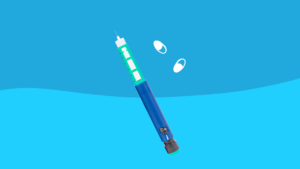Can I Take Januvia at Night? Guide to Taking Sitagliptin Tablets
HOME | DIABETES EDUCATION | CAN I TAKE JANUVIA AT NIGHT? GUIDE TO TAKING SITAGLIPTIN TABLETS
Taking Januvia at night may benefit patients with type 2 diabetes, but if adverse reactions occur, stop taking Januvia and call your doctor. A benefit of your routine, aiding in consistent medication intake for better management. Make sure you stick to the prescribed daily dose of 100 mg without splitting the tablets. Adjustments may be needed for kidney concerns, so consulting your doctor is crucial.
Missed doses should be taken once remembered without doubling up. Be alert for allergy signs or Always be aware of the signs and symptoms of Managing low blood sugar is crucial for those on medications such as Januvia, which is used to treat adults with type 2 diabetes. and know how to manage them. issues.
For best results, follow guidelines closely, especially if you are pregnant or breastfeeding. If you’re curious about the timeframe for Januvia’s effectiveness and other important information, further insights are available.
Main Points
- Consider taking Januvia at night for medication consistency and management. If you miss a dose, wait until the time for your next dose.
- Consult your doctor for personalized advice on morning or evening dosing.
- Ensure consistent daily intake of the prescribed 100 mg dose.
- Avoid splitting Januvia tablets for safety and effectiveness.
- Discuss any missed doses with your doctor for proper guidance.
Best Time to Take Januvia
To get the most out of Januvia (sitagliptin), try taking it at night as part of your evening routine. It’s important to take Januvia at the same time each day to ensure consistent blood sugar levels work well. While you can take Januvia in the morning or evening, consistency is key for its effectiveness.
It’s a good idea to talk to your doctor about the best time to take Januvia. They can give you personalized advice based on your schedule and health needs. By working together, you can figure out if morning or evening dosing works better for you.
Januvia is a prescription medication for managing blood sugar in adults living with Type 2 diabetes. Januvia is generally well-tolerated, but it’s best to be consistent with the time of day you take Januvia. It doesn’t matter if you prefer to take it in the morning or at night.
Taking Januvia at night might be helpful if you prefer to take all your medications together or have a structured evening routine. Remember, the most important thing is to take it regularly to manage your medical condition effectively. for it to work properly. Your doctor can give you specific recommendations to make sure you’re getting the most out of your Januvia treatment.
Dosage Instructions for Januvia
When taking Januvia tablets For type 2 diabetes, follow your doctor’s prescribed daily dose. However, treatment with Januvia should not be used in pregnant women due to potential risks. The typical dose is 100 mg once a day. Don’t split, cut, or crush the tablets. Take Januvia at the same time daily, morning or evening, with or without food as advised.
Your doctor may prescribe DPP-4 inhibitors like Januvia for adults with type 2 diabetes. Adjust the dose based on your needs. For those with kidney issues, the dose may be lowered. For moderate kidney problems, the dose may be 50 mg daily. For severe kidney problems or if you’re on dialysis, the dose may be 25 mg daily. Always ask your doctor for the right Januvia dose for you.
Following your doctor’s dose instructions helps with effective treatment and reduces side effects like low blood sugar. Stick to the prescribed dose and consult your doctor for any needed adjustments to improve your treatment plan.
Risks of Splitting Januvia Tablets
Splitting Januvia tablets can be risky because it can lead to conditions requiring immediate medical attention, such as those that happen when people who take medicines called DPP-4 inhibitors like Januvia experience severe side effects, uneven dosages. This can make the medication less effective or cause harm due to inaccurate dosing. It may also change how the drug works in your body and could cause unintended side effects or reduce its benefits.
To stay safe, it’s important to talk to your doctor or pharmacist before splitting Januvia tablets. They can help you take the medication most safely and effectively for your condition.
Following the prescribed regimen, especially when using Januvia, is important for adults with type 2 diabetes. prescribed dosing instructions without splitting the tablets is the best way to ensure that Januvia works well for you and keeps you safe.
Consultation With Healthcare Provider
Before changing when you take Januvia, consult your healthcare provider, especially if you experience any severe side effects that might indicate you should stop taking Januvia and call your doctor immediately. talk to your doctor first.
They can help you figure out if taking it at night is right for you. Your doctor will consider things like your daily routine and health history to give you the best advice.
Impact of Missed Doses
If you forget to take your Januvia dose, try to take it as soon as you remember. It’s important to stay consistent with your medication for better blood sugar control is crucial, especially for patients with type 1 diabetes.
Don’t take two tablets at once to make up for a missed dose, as it can cause side effects. Cutting or halving Januvia tablets isn’t recommended; always take the full prescribed dose.
If you often miss doses, talk to your doctor for guidance on managing missed doses effectively. Your doctor can help you stay on track with your treatment plan for better health.
Januvia and Hypoglycemia Risk
To avoid low blood sugar when taking Januvia, watch out for interactions with other medications that lower blood sugar levels, like sulfonylureas or insulin. Combining these with Januvia can increase the risk of hypoglycemia. If you’re on Januvia along with another blood sugar-lowering drug, your doctor may adjust the dosage to prevent low blood sugar.
Keep an eye out for signs of low blood sugar, such as headache, drowsiness, irritability, hunger, dizziness, confusion, sweating, jitteriness, weakness, and a fast heartbeat, especially if you are taking medicines called DPP-4 inhibitors like Januvia. Regularly check your blood sugar levels, stick to your diet and exercise plan, and talk to your doctor about how to manage signs and symptoms of low blood sugar effectively. prevent, recognize, and manage low blood sugar effectively while taking Januvia.
Januvia Usage With Metformin
Combining Januvia with metformin helps control blood sugar in type 2 diabetes. Januvia and metformin work together to improve glycemic control without causing low blood sugar or weight gain.
A convenient option is Janumet, a pill with both sitagliptin and metformin. It’s safe and well-tolerated, similar to metformin alone.
Watch out for pancreatitis when starting or changing Januvia doses. Adjustments may be needed for patients with kidney issues to avoid lactic acidosis.
Using Januvia with metformin can effectively manage type 2 diabetes. Consult your doctor for personalized advice on dosing and safety.
Januvia’s Mechanism of Action
Januvia helps control blood sugar in people with type 2 diabetes by blocking the DPP-4 enzyme. This action boosts incretin hormones that regulate glucose after meals. By stopping DPP-4, Januvia keeps these hormones working longer, which helps manage blood sugar levels.
Studies show it can lower A1c, post-meal glucose, and fasting glucose levels without causing weight gain or low blood sugar risks. Januvia might also protect beta cells and improve their function, slowing diabetes progression.
Common Side Effects of Januvia
When taking sitagliptin tablets, you might experience common side effects like headaches or upset stomach. It’s important to know about the potential side effects of Januvia (sitagliptin) to manage your health well. Here are three important points to remember:
Common Side Effects: Januvia can cause mild side effects such as headaches, sore throat, runny nose, upset stomach, and diarrhea. Sometimes, when taken with certain diabetes medicines, it can also lead to swelling in the hands or legs.
Serious Side Effects: Be aware of serious side effects that need immediate medical attention. These include low blood sugar (hypoglycemia), pancreatitis, severe skin reactions with blisters (bullous pemphigoid), kidney damage, intense joint pain, and heart failure. If you notice any of these serious side effects, contact your doctor right away.
Monitoring and Reporting: While mild side effects are common, talk to your doctor if they continue or bother you. Keep an eye on your health while using Januvia and report any worrisome symptoms promptly to ensure proper care.
Knowing about the possible side effects of Januvia helps you stay proactive in managing your health and getting timely medical help when necessary.
Timeframe for Januvia Effectiveness
When you start taking Januvia for type 2 diabetes, it begins to lower your blood sugar levels within 1-2 weeks. To fully benefit from Januvia, it may take around 3-6 months.
Studies show that after 24 weeks of using Januvia, A1C levels decreased by 0.6% from 8.0%. When Januvia was taken with metformin, A1C levels dropped even more, showing a 0.7% decrease after 24 weeks.
Blood Sugar Control With Januvia
Januvia, or sitagliptin, helps control blood sugar in type 2 diabetes. It boosts insulin after meals and lowers glucose made by the liver. Take it once daily, with or without food, in 25 mg to 100 mg tablets.
Watch for low blood sugar (hypoglycemia) when using DPP-4 inhibitors like Januvia, be aware of the potential for developing symptoms of low blood sugar. Januvia, especially with insulin or sulfonylureas. Check blood sugar often and adjust doses as needed.
Januvia can reduce A1C levels by 0.6% after 24 weeks, starting at 8.0%. It takes a few months to see full benefits, with best results in 3-6 months. Follow your doctor’s advice and track your blood sugar to manage type 2 diabetes effectively.
Safety Considerations for Januvia
When using Januvia, patients need to watch out for some important safety points to stay healthy while on this medication and report any symptoms of low blood sugar. Januvia can cause side effects like allergic reactions, so if you have any signs of an allergy, make sure to see a doctor.
Combining Januvia with insulin or sulfonylureas can increase the risk of low blood sugar, so you may need to adjust other medication doses to prevent this.
If you have moderate to severe kidney problems, you might need to change the dose of Januvia to avoid a condition called; tell your doctor right away if you experience symptoms of a serious allergic reaction. lactic acidosis, especially if you’re also taking metformin.
It’s not clear if Januvia is safe for pregnant women For those breastfeeding, so it’s best to talk to your doctor before using it. Especially when considering medications like Januvia if you are allergic.
Some people have reported severe joint pain while taking Januvia. If you experience intense and disabling joint pain, tell your healthcare provider right away for proper evaluation and care.
Frequently Asked Questions
Can I Take Januvia Before Bed?
You can take Januvia either in the morning or evening, once a day. Consult your doctor to decide the best time for you.
Can I Take Sitagliptin at Night?
You can take sitagliptin at night if your doctor recommends it. Take the tablet whole, do not split or crush it. It’s important to take it consistently every day. If you have any questions, ask your doctor for advice.
Is Sitagliptin the Same as Januvia?
Yes, Sitagliptin and Januvia are the same because they both have the active ingredient sitagliptin phosphate. Just follow what your doctor tells you about how much and when to take this medicine for managing type 2 diabetes well.
Is It Safe to Take Januvia Twice a Day?
Take Januvia once a day as prescribed by your doctor. It’s best to stick to the recommended daily dosing to ensure it works effectively. You can take Januvia in the morning or evening but always consult with your healthcare provider before changing the timing.



